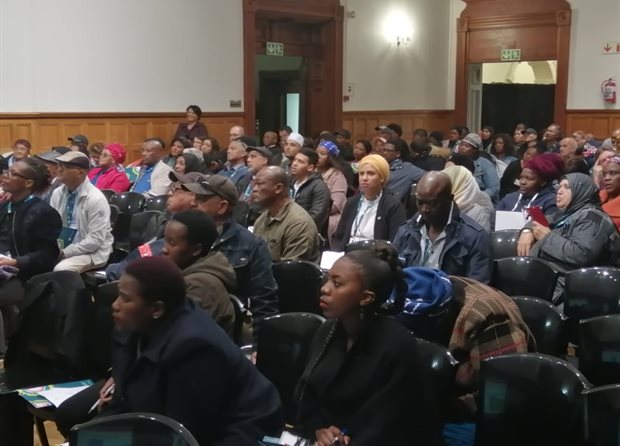
Subscribe & Follow
#AfricaMonth
In the news
Traders gather at CoCT's annual Informal Economy Summit

"While Cape Town’s informal sector may be relatively small, especially by emerging country standards, its penetration into the most vulnerable households in the city and its impact in terms of poverty reduction are large," said the City’s Mayoral Committee Member for Urban Management, Alderman Grant Twigg, during his opening address at the Informal Economy Summit held on Sunday.
Alderman Twigg further added that if traders are successful, communities become successful. He requested traders to provide feedback to the City on what can be done to enable growth, improve trading spaces, safer spaces and the business support that they need.
The city’s informal economy is made up of small- and micro-enterprises who are either entrepreneurs running their own businesses, or informal traders at public transport interchanges, along roadways and in the vicinity of shopping centres.
Seeking solutions
The one-day Informal Economy Summit, was a culmination of engagement sessions that were held across the city in the form of round-table discussions and micro-enterprise workshops. According to the City, the aim of these sessions was to "lend a helping hand to the informal sector by listening to their concerns and collectively coming up with solutions".
The Summit programme tackled issues that were pertinent to traders and were raised at the various engagement sessions. The themes that were broadly covered included:
• A review of the Economic Growth Strategy that was opened up for input from the informal economy players
• How to improve the landscape to facilitate the ease of doing business and the mechanisms to facilitate the development of the informal economy
• Improving the management of business precincts to enable the growth of the informal economy. The discussions included precinct safety, landscaping and maintenance of public spaces, informal trading management, and the maintenance of a clean and attractive trading environment
• Identifying opportunities for recycling and separation of waste
• Business development and support for the community vendor programme and supplier development

A foothold in the urban economy
"Informal trading is not without its challenges. It is a tough balancing act between the formal and informal sectors. However, with proper guidance and support many of these challenges are resolved. Having said this, we should be mindful that informal traders enable large numbers of people to gain a foothold in the city’s urban economy and the City needs to support them in their ventures."
"It is a reality that the informal sector is probably the most likely to absorb people who leave formal sector employment, either voluntarily or involuntarily. With the shrinking job opportunities, we encourage individuals to consider entrepreneurship as opposed to joining the queues of unemployed individuals," said Alderman Grant Twigg.
The City’s Mayoral Committee member for Economic Opportunities and Asset Management, Alderman James Vos said they recently undertook an exercise to revise the current Economic Growth Strategy because it is a priority to ensure that Cape Town continues to be the go-to city on the African continent and globally for business, trade and tourism. "After numerous interactions with internal and external stakeholders, the overall sentiment is that we should invest in programmes, projects and sectors that drive demand and makes business sense."
The informal sector is represented by a diverse array of economic activities including financial services, healthcare, retail in food and beverages, recycling, maintenance and repair of motor vehicles, and the repair of personal and household goods, to mention just a few.
"In this respect, the two barriers to growth most frequently cited by owners of informal businesses are access to better locations and stifling government regulations – both of which have implications for how the City of Cape Town can best maximise the sector’s potential to help reduce unemployment and poverty," added Alderman Twigg.
The way forward
According to the City, below are some of the outcomes from the summit and the next steps:
• Developing a strategic partnership between all stakeholders in the informal economy space to collaborate on the implementation of key developmental programmes.
• Initiating a structured engagement between the City and the informal sector and to review policies and by-laws that negatively impact on the growth potential of the informal economy.
• Maximise the opportunities in the waste economy by influencing changes in behavior and promoting recycling by focusing on sorting of waste at source
• Improving the management of key business precincts that benefit both the formal and informal sector. This would require the involvement of both private and public sector role-players as well as community-based organisations.
Related
How GoodApp plans to formalise SA’s informal service sector 17 Mar 2025 The legalisation of spaza shops in SA: an analysis of government efforts 3 Mar 2025 Red tape or progress? How registration woes are impacting spaza shops 28 Feb 2025 Regulating spaza shops: policy versus practicality 27 Feb 2025 How BevCo is tapping into SA’s township economy 12 Sep 2024 Cashless or not? Exploring the future of digital payments in Africa 21 Aug 2024














